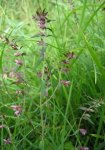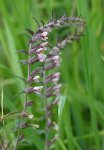Common tooton - odontites vulgaris l.
Family Scallopiaceae - Scrophulariaceae
Botanical characteristics. Annual herbaceous plant. Root stem. The stem is straight, branchy, up to 80 cm high, with arcuate lateral shoots. The leaves are lanceolate, pointed at the apex, sessile, dentate, pubescent. The flowers are reddish, in dense, one-sided brushes. Fruit is a two-cavity boll. Seeds are oval, furrowed, brown. Blooms in July - August, fructifies in August - October.
Spread. It grows in fields, pastures, near roads, like weeds in crops.
Used parts of the plant. Medicinal raw materials are aboveground part, leaves, flowers, seeds, less often roots, collected in the usual way.
Chemical composition. Root roots contain iridoids, cardenolides, alkaloids, vitamins. In the aerial part - iridoidy (aukubin, kotalpol, odonontozid and their derivatives), carotenoids, vitamins, phenolcarbonic acids, tannins, coumarins, flavonoids; In seeds - fatty oil.
Application. In folk medicine infusions and decoctions of denticles are used for various gastric diseases, tumors, hepatitis, pneumonia, as an expectorant, analgesic for toothache; In the Komi - with edema of various etiologies, dermatoses.
In Mongolian medicine, dentate preparations are used for bleeding from the nose, hemorrhoids, syphilis, as a wound-healing agent. In Tibetan medicine is widely used as antipyretic, anti-inflammatory drug, with blood diseases, with sepsis, infectious diseases, hypertension, acute and chronic hepatitis; In diseases of the liver and bile ducts, as part of complex words, as regulating neuroendocrine processes; Bronchitis, pneumonia, laryngitis, gout, respiratory infections, nephritis, for the prevention and treatment of sclerosis, cardiovascular and nervous diseases; When treating oncological diseases.
In the experiment, infusions and water-alcohol extracts of flowers and the aerial part of the plant have choleretic, hypotensive, sedative, cardiotonic, anticonvulsant, haemostatic effects. Improve the function of the liver; Show antioxidant, antihistamine, bacteriostatic activity.
Fresh juice of flowering plants and flowers - an effective tool for cardiovascular diseases, blood diseases; Improve blood circulation.
Dry extract of ordinary dovetail is recommended for inclusion in scientific medicine.
Zubchatka is a honey plant, fodder for all kinds of animals.
Preparation
- To get the infusion take 15 g of flowers and leaves, pour 200 ml of boiling water, insist on a water boiling bath for 15 minutes, cool 45 minutes, filter. Take should be 1/3 cup 3 times daily after meals.
- For broth 10 g of roots, aerial parts or seeds, pour 180 ml of boiling water, insist on the bath for 30 minutes, filter, bring to the desired volume. Take 2 tbsp. Spoon 3-4 times a day after meals.





Comments
When commenting on, remember that the content and tone of your message can hurt the feelings of real people, show respect and tolerance to your interlocutors even if you do not share their opinion, your behavior in the conditions of freedom of expression and anonymity provided by the Internet, changes Not only virtual, but also the real world. All comments are hidden from the index, spam is controlled.